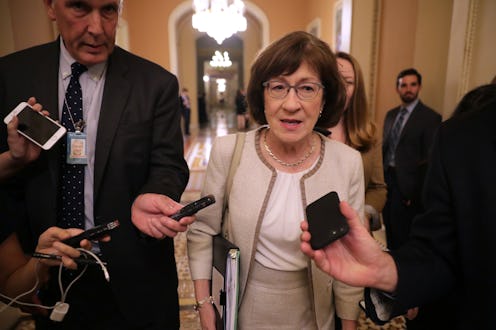News
Here's How The Senate Would Have To Vote In Order To Block Kavanaugh's Nomination

Just about the entire country is waiting with bated breath to learn the fate of Brett Kavanaugh, President Trump's latest Supreme Court nominee. After one of the most contentious Senate testimonies in years and a string of twists and turns, Kavanaugh's confirmation is expected to reach the Senate floor very soon — and naturally, this has many people wondering exactly how many senators have to vote against Kavanaugh to keep him off the Supreme Court.
The answer is 51. As long as all 100 senators cast a vote one way or the other on Kavanaugh, he will be confirmed to the court unless 51 or more senators vote against his nomination. Practically, this means that every Democratic senator plus two Republican senators will have to vote against Kavanaugh in order for his nomination to fail.
Technically, a nominee needs 51 votes to be confirmed by the Senate, which suggests that Kavanaugh could be defeated with a mere 50 votes against him. But per Senate rules, the vice president casts the deciding vote if the chamber ties; because Vice President Mike Pence supports Kavanaugh, this means that 51 senators will have to cast votes against Kavanaugh to prevent him from being confirmed.
It's too soon to say where those 51 votes will come from — if they come at all. But if Kavanaugh is defeated, it will most likely be because he receives a "nay" vote from every Senate Democrat* and at least two of the following three Republicans: Susan Collins, Lisa Murkowski and Jeff Flake. (*Officially, only 47 senators are members of the Democratic Party, but an additional two independent senators — Bernie Sanders and Angus King — caucus with Democrats.)
Collins and Murkowski, though still conservative, are easily the most moderate Republicans in the Senate, and neither have committed to supporting Kavanaugh. More importantly, they've defied Republican leadership on high-profile, high-priority agenda items in the past. In 2017, Collins and Murkowski cast crucial, deciding votes against repealing Obamacare, and were the only two Republican senators to vote against defunding Planned Parenthood that same year.
Although Collins and Murkowski have been extremely tight-lipped on their intentions, both of them have powerful interest groups in their states that are opposed to Kavanaugh, albeit for different reasons. It's not inconceivable that either or both might oppose him on an up-or-down vote.
Flake, by contrast, has shown no such willingness to break ranks and vote against Republican leadership on high-profile policies or nominees. Despite his vocal criticism of the president, Flake has ultimately voted in line with President Trump's position 83 percent of the time since Trump took office, according to FiveThirtyEight.
And yet it was Flake who single-handedly delayed Kavanaugh's confirmation vote last Friday when, in a move that shocked Democrats and Republicans alike, he demanded that that the FBI investigate the sexual assault allegations against Kavanaugh before the Senate voted on his nomination. Republicans relented, a planned Tuesday vote on Kavanaugh was indefinitely delayed, and Trump ordered an FBI investigation into Kavanaugh.
Moreover, some of Flake's recent comments have given encouragement to Kavanaugh's opponents. He said, for instance, that he'll vote against Kavanaugh if it's discovered that he lied under oath while testifying before the Senate, or if the FBI probe unearths further information about the sexual assault allegations against Kavanaugh that could affect his vote. (Kavanaugh has categorically denied all allegations of sexual misconduct.)
The results of the FBI probe haven't been released. But as the Huffington Post noted, Kavanaugh did tell several demonstrable lies during his testimony on Thursday. Whether Flake deems them significant enough to sway his vote is unclear, of course. In totality, though, his vote appears far more up for grabs than any other Republican in the Senate, save Collins or Murkowski.
There are any number of ways this could play out. A red state Democrat could break ranks and vote for Kavanaugh, for instance, or Kavanaugh's nomination could be withdrawn entirely. In all likelihood, though, the fate of Kavanaugh's nomination lies in hands of just three people: The senior Republican senators from Maine, Alaska and Arizona.